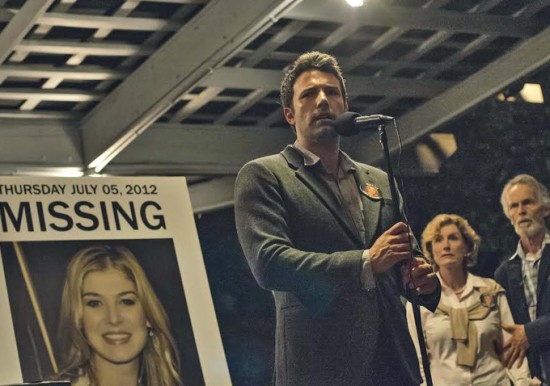'Donnie Darko' Director Richard Kelly Reviews David Fincher's 'Gone Girl'
I've always loved hearing filmmakers discuss movies. We've often printed interviews where we ask filmmakers about their favorite films and the /Filmcast has tried to bring on directors to review the latest big screen movies. That hasn't been as constant of a feature as David Chen and I originally planned, because as it turns out, people in the movie industry generally don't like to publicly bas other filmmaker's projects and we generally only got yeses from those directors who had a positive take on the film at hand. But I've always enjoyed hearing filmmakers discuss the movies they love and the current state of cinema.
Richard Kelly, writer/director of Donnie Darko, Southland Tales, and The Box, has always made his opinions and himself very accessible (actually, I almost wish he wouldn't have explained the intentions and meanings behind his films, as they serve better as mysteries with no definitive answer). And this week, like many of us, he saw David Fincher's latest film Gone Girl and wrote a bit about it on his blog. Find out more about the Richard Kelly Gone Girl review, after the jump.
Richard Kelly's essay titled GONE GIRL and EYES WIDE SHUT: A Study of Psychopathy in the Heteronormative Patriarchal Occult appears on his tumblr account RonaldTaverner. Here is an excerpt (Warning, spoilers may follow for both movies):
There are very few true wizards of cinema and Fincher clearly belongs on that list along with Stanley Kubrick. The release of Gone Girl feels like a welcome relief. An event long overdue—worthy of an epic three-part spoiler-filled 4741 word essay for Talkhouse Film—(God bless you if you're still reading this). Fincher's 10th feature film is riveting, exquisitely crafted and spectacularly entertaining. It walks a tightrope above the trappings of various genres, rising above them all to become the most unique of cinematic experiences. It is the movie we have been waiting for—and the movie we sorely deserve. Having read Gillian Flynn's novel before seeing the film it became clear to me that the filmed version of Gone Girl would become—in Fincher's deft hands—some kind of kindred spirit to the misunderstood Kubrick sexual odyssey released fifteen years ago. The blindfold is now off and the ugliness is there in plain sight.
Then the essay becomes a comparison of both films:
Both Gone Girl and Eyes Wide Shut are deeply twisted, satirical and borderline maniacal erotic thrillers that seem to be made my a snickering auteur—well aware that the institution of marriage itself is being bathed in a hot dose of Tyler Durden's corrosive lye soap from Fight Club. Both films show broken marriages that can only be repaired by ritualistic, meticulously calculated blood sacrifices. Both films deconstruct the patriarchal, heteronormative surface world with the introduction of a dangerous psychopath intent on preserving it.
Leading to a more in-depth examination, something you'd expect of a long-form journalist than a filmmaker. But remember, Richard Kelly is first and foremost a writer. The conclusion?
In the end—Gone Girl isn't an evisceration of marriage—it's an evisceration of greed and narcissism as the driving motivation of psychopathy within a horrid, unholy marriage. Welcome to the 1%, Nick and Amy. I think you'll find yourself in some familiar company. I hear Bill and Alice Harford have finally called it quits and their Manhattan apartment is for sale.
I highly recommend reading Richard Kelly's complete essay, GONE GIRL and EYES WIDE SHUT: A Study of Psychopathy in the Heteronormative Patriarchal Occult, on his tumblr account RonaldTaverner.
